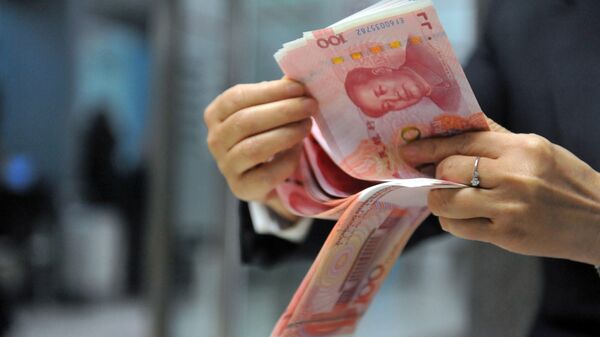According to the chairman of the agency, Yan Yan, among the Russian companies interested in placing bonds in China are government institutions, financial institutions and industrial companies.
He added that two Russian companies had already made significant progress in receiving ratings. Currently, the sum of the planned issuance is not large because this segment of the market is developing. Yan Yan assessed the issuance at between one and three billion yuan ($150-452 million).
"Russian companies are interested not only in placing bonds in China but also in investing in the Chinese economy because of high earning yields," Yan Yan was quoted as saying by the magazine.
In the future, China Chengxin plans to enter the Russian credit rating market, he added.
The agency was established in 1992 by the People’s Bank of China and the country’s Ministry of Commerce. One of the company’s stakeholders is Moody’s international rating agency.
Russian companies entering the Chinese debt market is becoming a stable and predicted trend, Sergei Guskov, president of the industrial holding Energia, told Expert.
Major Russian companies have been considering entering the Chinese debt market since late-2015. Many Russian companies are now turning from the West to China as a reliable and lucrative partner.
Before 2015, foreign investors were banned from entering the Chinese debt market but now Russia and China are joining forces to change the situation. Moscow and Beijing are developing legal and technical framework for debt and investment cooperation. One of the first companies ready to enter the Chinese market is Russian aluminum producing giant Rusal. The company started to work with China Chengxin in 2015.
In addition to Rusal, such major Russian companies like VTB Capital, Gazprombank, Sberbank and Rosselkhozbank have been interested in the Chinese debt market. In turn, Asian investors are interested in commodity markets and banking.
First of all, Russian telecom carriers will enter the Chinese market because they have already received loans from Chinese banks. Then, major banks like VTB and Sberbank would follow, Georgiy Vaschenko, senior manager at Freedom Finance, said.
According to him, in the near future there will be five Russian companies in the Chinese debt market. In the long-run, the number may reach 20.
He added that the situation would also depend on the exchange rate of Asian currencies. For example, the downward trend may end due to actions by the US Federal Reserve and interest rates may go up which would be bad for borrowers.
"Chinese rating agencies are also a very interesting part of the story," he added.
Usually, they publish their ratings independently from the Big Three credit rating agencies (S&P, Moody’s and Fitch). For example, Dagong agency gave Russia the highest credit rating, even higher than the United States.
"I’m sure that China Chengxin would give Russian companies very high ratings," Yakovenko said.
At the same time, he warned from overestimating the perspectives of Chinese investment in Russia. Two years after Western sanctions were imposed Russian companies have not made big steps in the Chinese market. Moreover, currently China is seeing an economic downturn so foreign companies are cautious about the Chinese market, he concluded.





